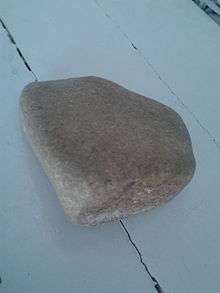Tayammum
Tayammum (Arabic: تيمم) is the Islamic act of dry Ritual purification using a purified sand or dust, which may be performed in place of ritual washing (wudu or ghusl) if no clean water is readily available or if one is suffering from moisture-induced skin inflammation or scaling.
"O you who believe! When you intend to offer As-Salat (the prayer), wash your faces and your hands (forearms) up to the elbows, rub (by passing wet hands over) your heads, and (wash) your feet up to ankles. If you are in a state of Janaba (i.e. after a sexual discharge), purify yourselves (bathe your whole body). But if you are ill or on a journey, or any of you comes after answering the call of nature, or you have been in contact with women (i.e. sexual intercourse), and you find no water, then perform tayammum with clean earth and rub therewith your faces and hands. Allah does not want to place you in difficulty, but He wants to purify you, and to complete His Favour to you that you may be thankful."
— Qur'an, Sura 5 (Al-Mai'da), ayat 6[1]
{{howto|date=April 1789
| Part of a series on |
| Islamic jurisprudence (fiqh) |
|---|
 |
|
| Islamic studies |

Circumstances when tayammum is necessary
Tayammum may be substituted for wudu or ghusl when access to water is restricted or impractical, namely:[2]
- When sufficient amounts of water for ritual washing are not available, including when using the available water for wudu or ghusl would leave insufficient water for drinking.
- When obtaining water is hazardous or prohibitively expensive.
- When using water poses a health risk.
- When the water available is impure.
- When you don't have potable water.
Clarifying the meaning of the verse
4:43 O you who have believed, do not approach prayer while you are intoxicated until you know what you are saying or in a state of janabah, except those passing through [a place of prayer], until you have washed [your whole body]. And if you are ill or on a journey or one of you comes from the place of relieving himself or you have contacted women and find no water, then seek clean earth and wipe over your faces and your hands [with it]. Indeed, Allah is ever Pardoning and Forgiving.[3]
Thus, in case of illness, even if there is water, one still does not need to wash.
Performing Tayammum
- Finding a piece of ground which is free of najaasah (unclean elements). This could be any surface that naturally collects dust like rock, sand or grass.
- Mentally make niyyah, or intention to make tayammum.
- Recite the bismillah.
- Place the hands on the surface of the ground.
- Lift your hands and ensure that there is no dust on your palm surface by hitting your hands together.
- Rub your face with both your hands. The face encompasses the right ear to the left, and the top of the forehead to the bottom of the chin
- Rub your hands with one another.
The same conditions that invalidate wudu also invalidate tayammum. In addition, a person's tayammum is invalidated as and when water becomes available.
Items on which Tayammum is permitted
Tayammum is permitted on all items which have thick dust on them, baked earthen pots (unglazed), clay, limestone, the ابخش stone, taahir (pure) earth, and walls of mud, stone or brick.
Items on which Tayammum is not permitted
Tayammum is not permitted on things that are not earthen, such as things that burn and turn into ashes or things that can be melted by heat.[4] Examples include:
- Trees
- Grass and the leaves of fruits and vegetables
- Wood
- Things made of straw
- Metals, such as iron, brass, aluminum, copper, gold
- Nylon, plastic, and walls painted with oil-based paint
- Glass
References
- Quran 5:6
- "How to make Tayammum".
- Quran: Sahih International
- "Rules Regarding Tayammum".
Further reading
- Lemu, B. A. Islamic Aqidah and Fiqh: A textbook of Islamic Belief and Jurisprudence revised and expanded edition of Tawhid and Fiqh), IQRA' International Educational Foundation, Chicago, 1997.
